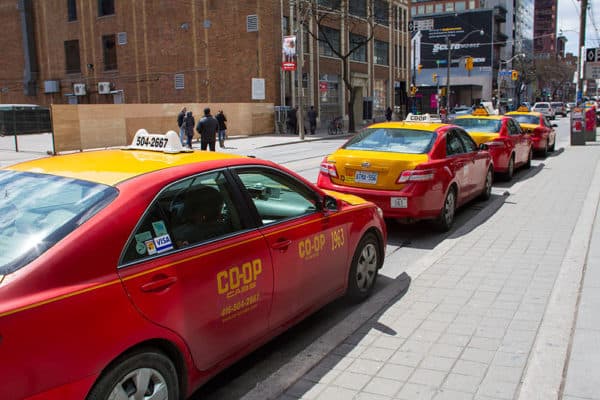John Tory is right about Uber and that’s a good thing for Toronto

 Some Torontonians might just be learning about Mayor-elect John Tory, but his position on Uber suggests the city isn’t just getting a sober alternative to Rob Ford, but a leader with some vision and technological savvy.
Some Torontonians might just be learning about Mayor-elect John Tory, but his position on Uber suggests the city isn’t just getting a sober alternative to Rob Ford, but a leader with some vision and technological savvy.
Tory, who will officially take office on December 2nd, thinks those battling the ride sharing app that allows anyone with a vehicle to become a de-facto taxi are simply on the wrong side of history.
“These kinds of technological changes are here to stay,” Tory told the CBC recently. The long-time politician and former Rogers exec thinks the legal action some municipalities are looking to explore is simply a bad route.
“You sit down [with the operators] and sort these things out,” said Tory. “But you don’t sort them out from the premise that says these applications are going away, that we’re going to go back to the way things were before.”
And that’s the crux of the issue. A taxi industry that is desperate for protection wrongly believes it can put the genie back into the bottle. But what they won’t admit is what the Conference Board of Canada found in a recent study: Toronto’s taxi service isn’t cutting it.
The cost of a three-kilometre ride, including three minutes of waiting time, is $11.06 in the T.Dot, significantly higher than the $8.99 Winnipegers pay or the $9.71 Calgarians fork over.
So what’s really behind persistent claims that Uber is skirting the rules and jeopardizing public safety? Money, of course. The Toronto taxi industry generates more than $1.6-million in fares every day. William Mitchell, a professor of strategic management at the Rotman School of Management, say the taxi industry is currently a powerful lobby in every city. But he thinks those days may be on the wane.
A taxi industry that is desperate for protection wrongly believes it can put the genie back into the bottle. But what they won’t admit is what the Conference Board of Canada found in a recent study: Toronto’s taxi service isn’t cutting it.
“I think trying to protect an industry that may be fading is at best hopeless, at worst, counter-productive,” he told The Star recently.
The Washington Post’s Emily Badger wrote about how much is actually at stake for the incumbents. A “medallion” that grants the legal right to operate a taxi in Boston commands more than $700,000 and more than a million dollars in Manhattan. The value of medallions in the United States has more than doubled since 2009. In Montreal a taxi license can go foe $220,000, in Vancouver it is more than twice that.
“The taxi industry warns that without medallions, cities will lose their control over an essential public service,” writes Badger. “Uber counters that medallions have created a cartel that operates for its own benefit — and not in the best interests of the public.”
Uber’s stance in every city it has entered is that it is not a taxi service but a technology company that connects a passenger to a driver. The City of Toronto begs to differ, and just filed a lawsuit seeking an injunction against Uber Canada, arguing that it has been operating unregulated and unlicensed cabs since launching in 2012.
I think trying to protect an industry that may be fading is at best hopeless, at worst, counter-productive.
Traditional taxi operators know the threat from Uber is no joke. The company is currently valued at $18.2 billion, compared to Hertz, which is valued at at $12.5 billion and Avis, at $5.2 billion. Uber is a formidable opponent if there ever was one.
Uber, and when I say Uber I mean Lyft, AirBnB, Boatbound, DogVacay, Couchsurfing, Desktime, SnapGoods: whatever iteration of whatever business is being disrupted, is here to stay. The sharing economy is an idea that could only be born of recession, but it is one that will continue to thrive in better times. Why? First, because it has the ability through technology to slip into grey areas and to morph into something else almost immediately. If Toronto were to ban Uber how long before another GPS-based app pops up to connect someone wanting a ride with someone wanting a car? A day? An hour?
The other reason the sharing economy is here to stay is because it simply makes sense.
“Beneath all the hype is a sensible idea: there are a lot of slack resources in the economy,” said The New Yorker’s James Surowiecki in a piece from last September. “Assets sit idle—the average car is driven just an hour a day—and workers have time and skills that go unused. If you can connect the people who have the assets to people who are willing to pay to rent them, you reduce waste and end up with a more efficient system.”
Tory’s resolve on Uber will be tested. But Toronto-residents will learn a lot about how the soon-to-be mayor will perform in his term through the Uber experience. So far, he is sounding logical, conciliatory and rational. These are traits that have been in short supply at Toronto City Hall since October 25, 2010, the day Rob Ford was elected.
Nick Waddell
Founder of Cantech Letter
Cantech Letter founder and editor Nick Waddell has lived in five Canadian provinces and is proud of his country's often overlooked contributions to the world of science and technology. Waddell takes a regular shift on the Canadian media circuit, making appearances on CTV, CBC and BNN, and contributing to publications such as Canadian Business and Business Insider.
